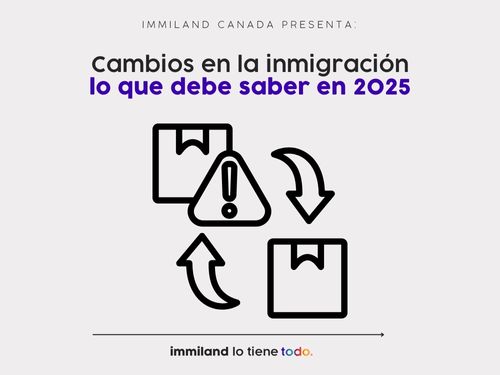Changes in Canadian immigration: what you need to know in 2025

.jpg)
Canada's immigration landscape is changing faster than ever. This 2025, there have been new restrictions, fewer visa approvals and increasingly higher rejection rates on study and work permits. Some have been successful in achieving their immigration goal, but others have been left in limbo because they have not done their process correctly, either due to unfamiliarity with the Canadian system or common avoidable mistakes .
The truth is that both applicants and institutions face great challenges. In this blog, I will share a summary of the most salient changes and the key to getting the immigration process on track with the professional help of CICC regulated consultants. Let's get started!
Collapse of study permits: what happened to approvals?
International study permits plummeted by nearly 90,000 during the first half of 2025 compared to the previous year. The approval rate fell to 43%, well below the historical average.
This collapse in study permit approvals was triggered by the government's decision to set a cap on the inflow of international students in order to alleviate the housing crisis and pressure on services in several provinces.
The decline in approvals far exceeds the official goal of reducing them by 10%, which has severely affected colleges and universities.
Pass/fail rates by category (2025)
Analysis of these figures reveals that the Canadian government is prioritizing immigration directly linked to labor market needs. The temporary worker programs (TFWP and IMP) have exceptionally high approval rates.
Public opinion against immigration: why?
Polls show that nearly 75% of Canadians support reducing immigration. Politicians of all parties have responded by tightening policies, including calls to impose strict limits and even eliminate the Temporary Foreign Worker Program. But why the backlash?
The growing rejection of the arrival of new immigrants is primarily associated with a perception that rapid population growth is putting unsustainable pressure on Canada's infrastructure and cost of living. The housing crisis, in particular, is a driving factor in all that has been occurring, with many Canadians attributing the high cost of renting and buying homes to the massive and progressive arrival of immigrants.
Added to this are concerns about the capacity of the healthcare system and other public services to meet the demand of a growing population.
Reduction in work permits and family reunification: more consequences
The work permit denials and reduction in family reunification are due to a change in Canada's immigration strategy.
- The overall work permit approval rate fell to 69%, with programs such as International Experience Canada achieving just 49%.
- Family reunification was reduced by 20%, leaving many families facing longer waits and more uncertain outcomes.
These figures reflect Canada's efforts to slow the pace of migration.
Impacts on housing and the economy: what changes and restrictions generate.
In view of the migratory changes in 2025, it is important to reflect on the extent to which these patterns may have an impact.
- Relief in the housing system: migration cuts are projected to reduce the housing deficit by more than 500,000 units by 2030.
- Economic risks: employers in healthcare, construction and technology warn of labor shortages and impact on innovation.
- Universities at risk: the fall in international enrollment threatens the financial stability of institutions highly dependent on these fees.
Integrity and fairness concerns: is the automated immigration system working?
Many applicants report rejections with generic answers, which has led to the fear of falling into the "hands" of automated decisions without human review. Federal court proceedings are becoming the only avenue to obtain actual review, but they are costly and can take years.
And what is the solution to this possibility of being evaluated by a robot and having to go to federal court? Undoubtedly, guided immigration planning.
Why it is important to hire an immigration professional
With declining approval rates and increasingly stringent requirements, submitting a strong and well-prepared application is the key to immigration success in Canada. Immigration consultants and lawyers assure:
- That the applications meet IRCC's exact requirements.
- Letters of reference and supporting documents are correctly drafted.
- That rejections are minimized in anticipation of IRCC's increased stringency
- That legal remedies such as judicial review be considered in case of refusal.
From 2025 onwards, having a professional advisor will be more than useful, it will be necessary and can make the difference between the success or rejection of your application.
If you plan to study, work or join your family in Canada from 2025 onwards, it is time to seek expert legal advice and make your immigration process more successful.
At Immiland Canada, we have a free tool to assess your immigration profile and start your process with our team of CICC regulated consultants.
Contact us if you want to start your application with a better chance of success.
I hope this topic will be useful for your immigration plans. Thanks for reading, see you soon!
With love,
Immiland Canada
Note: This article does not constitute legal advice or legal opinion from an attorney. Rather, it is provided solely to inform readers about certain aspects related to the details of the law in legal matters.
























.jpg)